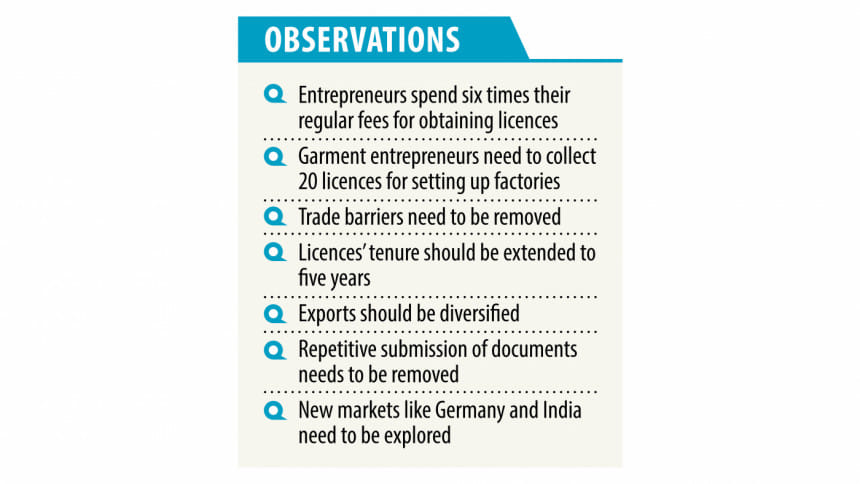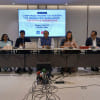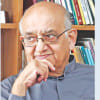Entrepreneurs spend 6 times more than official fees to obtain licences

Entrepreneurs in Bangladesh need to spend six times more than the official rates to obtain licences and other permits from government offices to do business, an economist said yesterday.
At least 20 licences are required to establish a garment factory in Bangladesh, which eats away at time and money, said Khondaker Golam Moazzem, research director of the Centre for Policy Dialogue (CPD).
"Similarly, entrepreneurs are facing difficulties in obtaining loans at competitive rates due to the presence of a massive amount of defaulted loans in the banking sector, owing to which banks are charging higher interest rates."
Also, they face a cumbersome process while trying to obtain loans from banks, Moazzem said while presenting a paper on "Business Related Barriers and Possible Way Out" at the Federation of Bangladesh Chambers of Commerce and Industry (FBCCI) in Dhaka.
The FBCCI, in collaboration with the CPD and German development agency GIZ, organised the discussion, which was attended by ministers, diplomats, businesspeople and bureaucrats. FBCCI President Mahbubul Alam chaired the discussion.
Moazzem said Bangladesh needs to find ways to do away with the need for businesses to repeatedly submit documents to collect and renew licences.
He suggested introducing digital document verification systems.
Heavy reliance on the single biggest export item, garments, has led to little growth in other sectors, according to the economist.
Foreign investors are facing difficulties in repatriating profits from Bangladesh due to the current US dollar crisis, he said.
At the discussion, businesses called for the withdrawal of trade barriers such as the requirement to repeatedly renew licences and for simplifying business processes to gain competitiveness.
The Bangladesh Investment Development Authority (BIDA) should help expedite all business processes and all kinds of licences need to come with a validity period of five years, the CPD researcher said.
Bangladesh has not yet become an attractive destination for German investment although there is a potential, said Jan Janowski, deputy head of mission of the German embassy in the country.
Other countries like India, Indonesia and Vietnam are enjoying Germany's China Plus One investment policy that aims to relocate German investment from China to other nations, he said.
German companies' arrival in Bangladesh increased by 20 percent over the last two years because of the China Plus One policy, but the potential is still high, he said.
After the Rana Plaza building collapse, reforms have come about in Bangladesh, he said, suggesting meeting compliance standards to obtain the Generalised Scheme of Preferences (GSP) Plus of the European Union.
"Regulatory barriers are major challenges to businesses," said Mostafa Abid Khan, a former member of the Bangladesh Trade and Tariff Commission.
One major barrier is the process to avail licences and it should be addressed as it costs time and money, he said.
Import and export registration certificates need not be renewed every year. India issues it just once and that works for the lifetime of businesses, Khan also said.
State Minister for Commerce Ahasanul Islam Titu said his ministry has already digitalised many systems.
He suggested doing more business with emerging markets like India and China to reduce overdependence on some selective markets.
Germany can be a good market for Bangladesh as the European nation imports goods worth more than $1,998 billion per year and Bangladesh exports goods worth only $8 billion to the country, Titu said.
Ahsan Khan Chowdhury, chairman and chief executive officer of PRAN-RFL Group, said Bangladesh was a growing economy.
With regard to compliance, he said Bangladesh was not falling behind China in the garment sector and Bangladesh needs to do good business with India.
Lokman Hossain Miah, executive chairman of the BIDA, said 125 licences have already been issued under its One Stop Service (OSS) and 25 services will be brought under the OSS within the next three months.

 For all latest news, follow The Daily Star's Google News channel.
For all latest news, follow The Daily Star's Google News channel. 








Comments